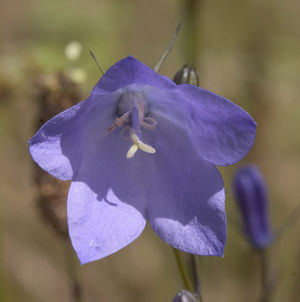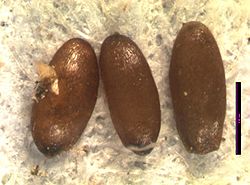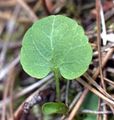Difference between revisions of "Campanula rotundifolia"
(Created page with '===Seed=== '''Abbreviation:'''CARO '''Seed sample from:''' 2011 '''Average Measurement:''' 1 x 0.4 x 0.2 '''Measurement Range:''' L: 1 - 1.1, W: 0.3 - 0.5, D: 0.2 - 0.3 ====F…') |
(→Description) (Tag: VisualEditor) |
||
| (35 intermediate revisions by 4 users not shown) | |||
| Line 1: | Line 1: | ||
| − | === | + | * Scientific Name: ''Campanula'' ''rotundifolia'' |
| − | ''' | + | * Family: Campanulaceae |
| + | * Common Names: bluebell-of-scotland, bluebell, roundleaf harebell | ||
| + | * Codon: CAMROT | ||
| + | ---- | ||
| + | [[File:CARO RodGilbert flw 7-2004.jpg |thumb|Photo by Rod Gilbert, 2007. Also featured on Main Page]] | ||
| + | === Taxonomy === | ||
| + | {{Taxobox | ||
| + | | name = | ||
| + | | image = | ||
| + | | image_alt = Campanula rotundifolia | ||
| + | | image_caption = Photo by Rod Gilbert, 2007. Also featured on Main Page | ||
| + | | regnum = [[Plant]]ae | ||
| + | | subregnum = Viridiplantae | ||
| + | | phylum = Tracheophyta | ||
| + | | subphylum= Spermatophytina | ||
| + | | classis = Magnoliopsida | ||
| + | | ordo = Asterales | ||
| + | | familia = Campanulaceae | ||
| + | | genus = ''Campanula'' L. | ||
| + | | species = '''''Campanula rotundifolia''''' L. | ||
| + | | binomial = | ||
| + | | binomial_authority = | ||
| + | | synonyms = *''Campanula rotundifolia'' var. ''velutina'' A. DC. | ||
| + | *''Campanula heterodoxa'' Vest ex Schult. | ||
| + | }} | ||
| + | <ref>Integrated Taxonomic Information System. Retrieved from https://www.itis.gov/servlet/SingleRpt/SingleRpt?search_topic=TSN&search_value=34497</ref> | ||
| + | ===Description=== | ||
| + | |||
| + | Perennial, typically glabrous, rhizomatous herb growing from a taproot, up to 80 cm tall with bluish purple flowers.<ref name=":0">WTU | ||
| + | Herbarium, Burke Museum, & University of Washington. Retrieved from http://biology.burke.washington.edu/herbarium/imagecollection/taxon.php?Taxon=Campanula%20rotundifolia</ref> Leaves entire;<ref name=":1">Hitchcock, C. L., Cronquist, A., Giblin, D., | ||
| + | & Legler, B. et al. (2018). ''Flora of the Pacific Northwest: an | ||
| + | illustrated manual''. Seattle: University of Washington Press. p. 515.</ref> basal leaves long petiolate,<ref name=":1" /> round to broadly ovate;<ref name=":2">Bowcutt, | ||
| + | F., & Hamman, S. (2016). ''Vascular | ||
| + | Plants of the South Sound Prairies''. | ||
| + | p. 80.</ref> cauline leaves alternate, linear, to 8 cm long.<ref name=":0" /> Inflorescences racemose.<ref name=":2" /> Flowers radially symmetrical,<ref name=":1" /> calyx lobes 5, linear;<ref name=":0" /> corolla campanulate, bluish purple, 5-lobed;<ref name=":1" /> stamens 5; ovary inferior, becoming nodding 3-celled capsule, 4-8 mm long.<ref name=":0" /> | ||
| + | |||
| + | ===Bloom Period=== | ||
| + | June - September<ref name=":0" /> | ||
| + | ===Distribution=== | ||
| + | Widely distributed throughout Washington; circumboreal.<ref name=":0" /> | ||
| + | ===Habitat=== | ||
| + | Open, rocky areas across altitudes<ref name=":0" /> with sandy, well-drained soils.<ref>Plants for a Future. Retrieved from https://pfaf.org/user/Plant.aspx?LatinName=Campanula+rotundifolia</ref> | ||
| + | |||
| + | ===Uses=== | ||
| + | |||
| + | First Nations - Use by a number of different tribes as heart and ear medicine, and as a fumigant for eye medicine. Navajo use as spiritual medicine for protection.<ref>Native | ||
| + | American Ethnobotany Database. Retrieved from http://naeb.brit.org/uses/search/?string=Campanula+rotundifolia</ref> | ||
| + | |||
| + | Wildlife - Attracts Butterflies, moths, birds, and bees.<ref>Washington Native Plant Society. Retrieved from https://www.wnps.org/component/rsdirectory/entry/view/69-campanula-rotundifolia&highlight=WyJjYW1wYW51bGEiLCJyb3R1bmRpZm9saWEiLCJjYW1wYW51bGEgcm90dW5kaWZvbGlhIl0=</ref> | ||
| + | |||
| + | ===Propagation=== | ||
| + | |||
| + | SEED PROPAGATION | ||
| + | |||
| + | For best results, seeds should be sown inside and not covered after sowing. They should be bottom-watered. These seedlings will germinate quickly but will not flower until the second year. Root cuttings or stem cuttings stuck in damp sand are other propagation methods useful for this species.<ref>Native Plants of North America. Retrieved from https://www.wildflower.org/plants/result.php?id_plant=caro2 | ||
| + | </ref> | ||
| + | {| border="1" | ||
| + | |- | ||
| + | | FloweringTime | ||
| + | | June- Sept | ||
| + | |- | ||
| + | | Seed CollectionTime | ||
| + | |Late July through mid-Sept. | ||
| + | |- | ||
| + | | Crop Intervals | ||
| + | | Perennial | ||
| + | |} | ||
| + | Fruit/Seed Dormancy and Treatment:No treatment. Seeds may need light for good germination. | ||
| + | ===Seed=== | ||
'''Seed sample from:''' 2011 | '''Seed sample from:''' 2011 | ||
| Line 7: | Line 75: | ||
'''Measurement Range:''' L: 1 - 1.1, W: 0.3 - 0.5, D: 0.2 - 0.3 | '''Measurement Range:''' L: 1 - 1.1, W: 0.3 - 0.5, D: 0.2 - 0.3 | ||
| + | [[File:CARO CNLMvol sd 2012.jpg|thumb|250px|Photo by Lisa Hintz]] | ||
====Features==== | ====Features==== | ||
| Line 20: | Line 89: | ||
'''Longitudinal Cross Section:''' elliptical [[File:CARO long.png]] | '''Longitudinal Cross Section:''' elliptical [[File:CARO long.png]] | ||
| + | {{Basics}} | ||
| + | |||
| + | ===Photo Gallery=== | ||
| + | |||
| + | <gallery> | ||
| + | File: CAMROT2.jpg|Photo by Ray Izumi, 2009 | ||
| + | File:CARO CNLMvol sdh 7-2007.jpg|Photo by CNLM volunteer, 2007. Courtesy of CNLM | ||
| + | File:CAMROT3.jpg|Courtesy of CNLM, example of highly variable basal leaf morphology | ||
| + | File:CAMROT4.jpg|Courtesy of CNLM, example of highly variable basal leaf morphology | ||
| + | File:CAMROT5.jpg|Courtesy of CNLM, example of highly variable basal leaf morphology | ||
| + | File:CAMROT6.jpg|Courtesy of CNLM, example of highly variable basal leaf morphology | ||
| + | </gallery> | ||
| + | ===References=== | ||
| + | |||
| + | <references /> | ||
Latest revision as of 12:16, 25 June 2021
- Scientific Name: Campanula rotundifolia
- Family: Campanulaceae
- Common Names: bluebell-of-scotland, bluebell, roundleaf harebell
- Codon: CAMROT
Contents
Taxonomy
| Scientific classification | |
|---|---|
| Kingdom: | Plantae |
| Subkingdom: | Viridiplantae |
| Phylum: | Tracheophyta |
| Subphylum: | Spermatophytina |
| Class: | Magnoliopsida |
| Order: | Asterales |
| Family: | Campanulaceae |
| Genus: | Campanula L. |
| Species: | Campanula rotundifolia L. |
| Synonyms | |
| |
Description
Perennial, typically glabrous, rhizomatous herb growing from a taproot, up to 80 cm tall with bluish purple flowers.[2] Leaves entire;[3] basal leaves long petiolate,[3] round to broadly ovate;[4] cauline leaves alternate, linear, to 8 cm long.[2] Inflorescences racemose.[4] Flowers radially symmetrical,[3] calyx lobes 5, linear;[2] corolla campanulate, bluish purple, 5-lobed;[3] stamens 5; ovary inferior, becoming nodding 3-celled capsule, 4-8 mm long.[2]
Bloom Period
June - September[2]
Distribution
Widely distributed throughout Washington; circumboreal.[2]
Habitat
Open, rocky areas across altitudes[2] with sandy, well-drained soils.[5]
Uses
First Nations - Use by a number of different tribes as heart and ear medicine, and as a fumigant for eye medicine. Navajo use as spiritual medicine for protection.[6]
Wildlife - Attracts Butterflies, moths, birds, and bees.[7]
Propagation
SEED PROPAGATION
For best results, seeds should be sown inside and not covered after sowing. They should be bottom-watered. These seedlings will germinate quickly but will not flower until the second year. Root cuttings or stem cuttings stuck in damp sand are other propagation methods useful for this species.[8]
| FloweringTime | June- Sept |
| Seed CollectionTime | Late July through mid-Sept. |
| Crop Intervals | Perennial |
Fruit/Seed Dormancy and Treatment:No treatment. Seeds may need light for good germination.
Seed
Seed sample from: 2011
Average Measurement: 1 x 0.4 x 0.2
Measurement Range: L: 1 - 1.1, W: 0.3 - 0.5, D: 0.2 - 0.3
Features
Shape: Seeds tapering slightly at hilium end and opposite apex.
Color: Hilium and opposite end are dark brown. The rest of the seed is light brown.
Surface:Seeds longitudinally striate and glossy.
Latitudinal Cross Section: elliptical 
Longitudinal Cross Section: elliptical ![]()
Basic Explanations and Assumptions:
The dimensions for the seeds are length x width x depth. The location of the hilum is used as the base of the seed, and the length is measured from hilum to the opposite apex. Where a style is present, the length is measured from the hilum to the bottom of the style. Width is measured at a right angle to the length at the widest part. Depth is measured at a right angle to the intersection of height and width lines.
Measurements included are the mean average for each measurement of ten separate seeds.
All measurements in millimeters unless otherwise noted.
Photo Gallery
References
- ↑ Integrated Taxonomic Information System. Retrieved from https://www.itis.gov/servlet/SingleRpt/SingleRpt?search_topic=TSN&search_value=34497
- ↑ 2.0 2.1 2.2 2.3 2.4 2.5 2.6 WTU Herbarium, Burke Museum, & University of Washington. Retrieved from http://biology.burke.washington.edu/herbarium/imagecollection/taxon.php?Taxon=Campanula%20rotundifolia
- ↑ 3.0 3.1 3.2 3.3 Hitchcock, C. L., Cronquist, A., Giblin, D., & Legler, B. et al. (2018). Flora of the Pacific Northwest: an illustrated manual. Seattle: University of Washington Press. p. 515.
- ↑ 4.0 4.1 Bowcutt, F., & Hamman, S. (2016). Vascular Plants of the South Sound Prairies. p. 80.
- ↑ Plants for a Future. Retrieved from https://pfaf.org/user/Plant.aspx?LatinName=Campanula+rotundifolia
- ↑ Native American Ethnobotany Database. Retrieved from http://naeb.brit.org/uses/search/?string=Campanula+rotundifolia
- ↑ Washington Native Plant Society. Retrieved from https://www.wnps.org/component/rsdirectory/entry/view/69-campanula-rotundifolia&highlight=WyJjYW1wYW51bGEiLCJyb3R1bmRpZm9saWEiLCJjYW1wYW51bGEgcm90dW5kaWZvbGlhIl0=
- ↑ Native Plants of North America. Retrieved from https://www.wildflower.org/plants/result.php?id_plant=caro2








